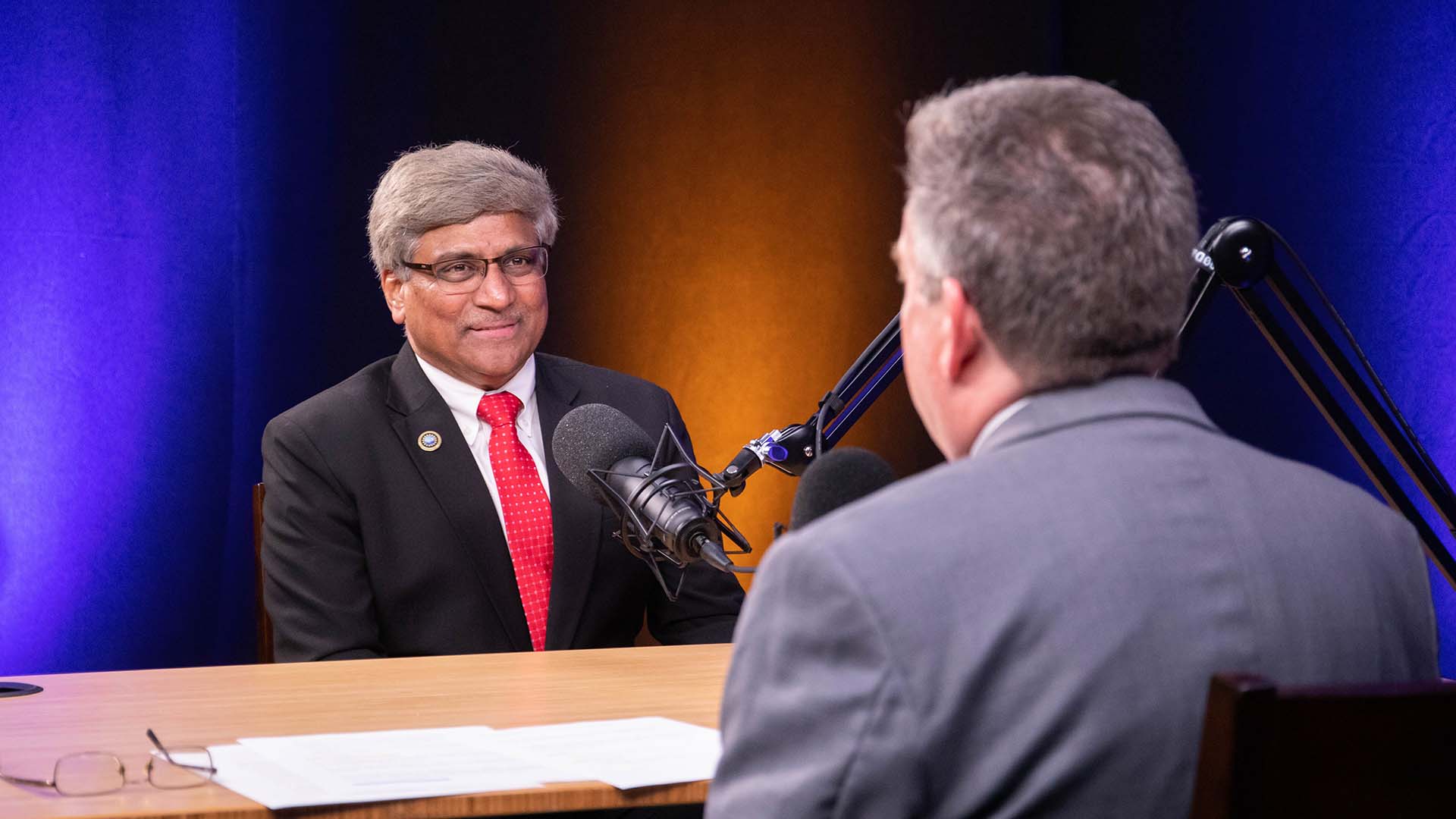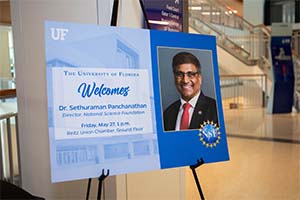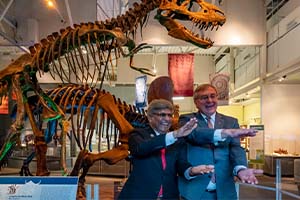NSF director: Let’s seize this moment to achieve prosperity for all

The Honorable Sethuraman Panchanathan, director of the National Science Foundation, visited the University of Florida on Friday, May 27, 2022. Photo credit: University of Florida/Bri Lehan
Welcome to From Florida, a podcast where you’ll learn how minds are connecting, great ideas are colliding and groundbreaking innovations become a reality because of the University of Florida.
The Honorable Sethuraman Panchanathan, director of the National Science Foundation, visited the University of Florida on Friday, May 27, to learn more about UF’s research initiatives and share his vision for accelerating scientific advancements to benefit all. In this episode of From Florida, the director shares that overview with guest host Dr. David Norton, vice president for research at UF. Produced by Brooke Adams, Brenda Such, Andrew Feigum, John Varley, Ami Blasberg and Isaiah Fetterman. Original music by Daniel Townsend, a doctoral candidate in music composition in the College of the Arts.
Dr. David Norton: Welcome to From Florida, where we share stories about the people, research and innovations taking place at the University of Florida. I'm your guest host, David Norton, vice president for research at the University of Florida.
I'm delighted to take over the podcast for a conversation with a very special guest and friend of mine, the Honorable Sethuraman Panchanathan, director of the National Science Foundation. Director Panchanathan has spent today on the UF campus talking to our researchers about their projects and about NSF initiatives. You're going to learn more about these initiatives in a moment, but first, a little background on our guest, the director.
Director Panchanathan has led the NSF for nearly two years and has set a clear vision for advancing our nation's scientific discovery, technological innovation and STEM education. The director has a distinguished career in science, technology, engineering and education that spans more than three decades. He previously served as the executive vice president at Arizona State University's Knowledge Enterprise, where he was also chief research and innovation officer.
As a computer scientist, Director Panchanathan's scientific contributions have advanced the areas of human-centered multimedia computing, haptic user interfaces and person-centered ubiquitous computing technologies for empowering individuals with a range of abilities. In other words, he worked to make use of technology easier for the rest of us. I could go on, but that gives you an idea of the director's background.

The Honorable Sethuraman Panchanathan, director of the National Science Foundation, visited the University of Florida on Friday, May 27. Photo Credit: University of Florida/Bri Lehan
Now, let's start our conversation with the director. Panch — you like to be called Panch — welcome to the University of Florida!
Director Sethuraman Panchanathan: Thank you very much for inviting me here today, David. I really appreciate that.
Dr. David Norton: Mr. Director, I would like to ask you a few questions. You recently said we are on the threshold of a revolutionary, fundamental scientific research endeavor that will drive our nation's prosperity. Why do you think that and what do you mean by prosperity?
Director Sethuraman Panchanathan: So, if you look at all the work that NSF has done over the last seven decades or more, you will find that NSF has made possible not only fundamental discoveries and innovations, but how do you also take those innovations and ensure that they are contextualized for human prosperity as well as economic prosperity? These two are, of course, very intertwined. And so, when we talk about the journey of NSF into the future, now I say this is a moment, it is a very important moment, because there is so much need out there in terms of prosperity not reaching everyone across the nation.
Talent and ideas everywhere across the nation are not being fully tapped and fully given the opportunities to express so that the nation can achieve even greater heights. Therefore, in this moment of global competition and the fact that we have talent and ideas democratized all across the nation and ready to play, how might we take the next 75 years of NSF and build an unbelievable prosperous future for ourselves? And that can be most certainly accomplished by advancing fundamental ideas in science resulting in amazing technologies and therefore making possible great futures.
Dr. David Norton: So, what does this mean for America's leading research universities? How can we and our states help the NSF and our country make the most of this potential?
Director Sethuraman Panchanathan: I always say NSF is a catalyst, an enabler. The real work happens in the universities, in the community colleges, in the K-12 institutions, in our partners, like industry and others. That's where the real work happens. So the universities are a huge part. You can call them the engine of innovation. You can call them the engine where the science prospers, where new ideas happen, where new talent gets inspired. So that's why it's very, very important that we focus on the universities of today and how we configure ourselves to the learning systems, universities and others, into the future.
Dr. David Norton: You've said that to meet this challenge that we need to graduate more students into STEM fields, a group that you've called the ‘missing millions.’ Will you share a few thoughts on how we might attract more students to these fields?
Director Sethuraman Panchanathan: Absolutely. You know, if I take my own journey, every one of us has a STEM spark waiting to be ignited. Yes, I am an optimist, but I truly believe in that. My STEM spark was ignited when, as an eight-year-old kid, I happened to have the opportunity of looking at the moon rocks that came from the Apollo Mission, and it circulated around the world thanks to the United States Consul Service. I saw this and, at that moment, I felt like, ‘Wow, if rocks from the moon can come here, and a mission can go up designed, bring this back here and an eight-year-old sees this,’ and that inspired me.
And therefore, there are many, many Panches — eight-year-old Panches and six-year-old Panches and two-year-old Panches and 10-year-old Panches and more — waiting to be inspired this way. And therefore, I'm strongly supportive of doing anything that can ignite the STEM spark all across the nation with all our youth. And if we do that, some may pursue science. Some may have this tremendous appreciation and marvel about science that they will carry with them in whatever they do. Either way, I think it's going to be fantastic for our nation.
Dr. David Norton: As our country looks forward, what are the challenges that we face to maintain our global competitiveness?
Director Sethuraman Panchanathan: I think what we need to do is to take this moment of competition — I always say competition is about seeing how we can be even more inspired to be faster, better, smarter — so this competition moment is a competitive moment, essentially expecting us do the same. We have always looked at the moments of competition. Look at the Sputnik moment, for example, right? We took that moment and said, ‘What can we do better, smarter, faster, more innovative?’ And so, this moment, therefore, is the same. It is inspiring us to do better, faster, more. And I therefore believe that this moment of global competition is not only going to make us better and, through that, we are going to open opportunities for everyone in our nation. And by that, we are going to partner with like-minded countries and unleash solutions for global prosperity and that will impact everywhere, not just only the United States.

NSF Director Sethuraman Panchanathan with UF President Kent Fuchs at the Florida Museum of Natural History on Friday, May 27, 2022. Photo: UF/Bri Lehan
Dr. David Norton: How is the NSF promoting new ways of working with our universities to propel scientific innovations and discoveries? What new partnership opportunities might be there?
Director Sethuraman Panchanathan: Absolutely, a fantastic question, David. If you look at NSF itself, if you want to solve the problem of, let's say, climate mitigation, climate adaptation, building climate resilience, we just came out of the NHERI Lab [Natural Hazards Engineering Research Infrastructure Experimental Facility]. If you want to solve those problems, you need transdisciplinary inspirations.
Yes, you need great physics, great mathematics, great computer science, great engineering, great biology and a whole lot more. But you also need to make sure that they all work together. Social, behavioral, economic sciences, working with computing sciences, working with all the disciplines, geosciences and so on. How do we bring this convergence of ideas, right? And that is partnerships within disciplines. Now, you talk about partnership with industry, partnership with community, partnership with K-12 systems, partnership with community colleges and others. You find that you're essentially building an ecosystem of ideas and talent that's going to address those global grand challenges, whatever that might be. And that's how we are going to really make significant progress into the future.
Dr. David Norton: So, you've spent the day with us here at the University of Florida, and you've seen how the University of Florida has made AI a centerpiece for our curriculum, ensuring that all students will have a basic familiarity with artificial intelligence, which you have called one of the most important industries of our future. What is your call to action on AI or similar strategic technologies and areas?
Director Sethuraman Panchanathan: Let me start with what I saw today. I was inspired by what is going on at the University of Florida. Along the spectrum of all the amazing things that AI is being made possible, whether it is a K-12 kind of an inspiration, whether it is an inspiration at the undergraduate level or masters or Ph.D. level. Or, whether it is solving a problem through AI or working with partners like Palm Beach State College — all these things gives me the confidence that AI everywhere across our nation, AI making possible things all across our nation, because talent and ideas all across the nation, in terms of what AI can do, will be enabled. It gives me tremendous confidence. So that's why I think the future we all know, like computational thinking, AI thinking is going to become part of the fabric of how we look at the future.
And AI is going to make possible also solutions where machines and humans are going to collaborate and work together and co-evolve together. And these futures are things that we need to think about now, how do we design and make sure that as we design them, that we take care of fundamental problems in AI, like whether it is ethics or whether it's bias or whether it's privacy, security and a whole host of things that are concerns. And you solve them as you design the technology and as you design the solution, by bringing in humanists, artists, social behavioral scientists as well as engineers, computing scientists and a whole lot more, so that we might build the future that it can deliver the promise of what it can deliver, that all of us can benefit from it and not feel excluded by it at all.
Dr. David Norton: Director, it has been a total privilege and joy to have you here at the University of Florida today. Thank you for joining us for this podcast and for visiting Gainesville, Florida, and the University of Florida.
Director Sethuraman Panchanathan: Thank you, David. I'll say, ‘Go Gators.’ You're doing a great job in terms of the fantastic work that you're doing. Carry on, because you are the representation and the exemplar of what the nation needs more and more and more of. Let's strengthen its speed and scale and let's do great work.
Dr. David Norton: Thank you.
Director Sethuraman Panchanathan: Thank you.
